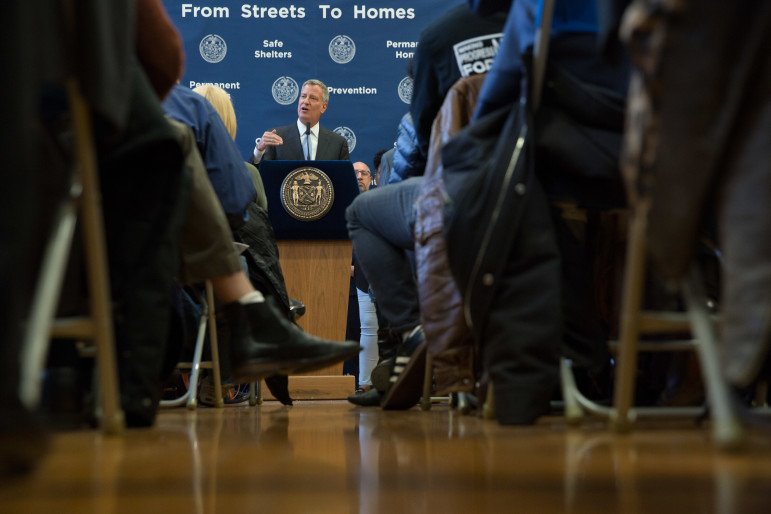
Michael Appleton/Mayoral Photography Office
Mayor de Blasio announces his plan to restructure homeless services at a press conference in the Bronx on Monday, April 11.
At the wildest mayoral debate in years on Tuesday night, assertions and accusations flew.
Some defy fact-checking, like Nicole Malliotakis’ implication that Bill de Blasio lacks a “moral compass” or Bo Dietl’s repeated assertion that he has “evolved.” Others are easy to confirm, like the fact that the mayor went to college (as Dietl noted more than once).
Has de Blasio “done nothing” on homelessness?
This was Dietl’s assertion. There’s plenty to criticize de Blasio on when it comes to the homeless situation but it’s hard to credit the claim that he’s done nothing at all. He did create several new voucher initiatives to replace the collapsed Advantage program and those have helped to move 60,000 people from shelters into permanent housing. He reestablished a connection between the shelter system and the public housing and Section 8 programs.
Have “felony sex crimes” increased during de Blasio’s tenure?
This is a fact that Malliotakis often stresses, and she’s right. According to the NYPD, there were 1,073 felony sex crimes in 2013, Mike Bloomberg’s final year as mayor, and 1,336 in 2016—an increase of 25 percent. “Felony sex crimes” is a category used by the NYPD for sex crimes other than rape, which is treated separately because it is one of the seven “major felonies” reported to the FBI. Felony sex crimes includes the crimes of Criminal Sexual Act, Sexual Abuse, Persistent Sexual Abuse, Aggressive Sexual Abuse, Course of Sexual Conduct Against a Child, Female Genital Mutilation. It’s worth noting that over the comparable period of Bloomberg’s final term (2009-2012), that category of crime increased 51 percent.
Did Malliotakis vote to preserve or expose MTA funding?
The mayor accused the Republican nominee of voting to approve Cuomo administration budget gimmicks that have moved funds from the transit system to the state’s general fund. His campaign pointed specifically to her vote against this year’s Assembly budget resolution, which opposed a transfer of $65 million. However, the budget resolution included dozens of proposals, so it’s a little bit simplistic to suggest that her vote was primarily on the issue of the MTA. As she contended, Malliotakis did support a measure that would have put MTA funds in a “lock box,” which Gov. Cuomo vetoed.
Does de Blasio get bundled money from lobbyists?
Malliotakis made this assertion as part of a larger critique of the mayor’s decision-making, and it is true. According to city Campaign Finance Board records, the mayor has in the 2017 cycle received $534,325 in money through intermediaries. Lobbyists Suri Kasirer ($56,030), James Capalino ($44,940), Harold Ickes ($19,250) and Sid Davidoff ($18,400) were among his top bundlers. Malliotakis received a far smaller amount of bundled donations; no major bundles are attributed to lobbyists.
Has the city really moved 281,000 people out of poverty?
The mayor has referred to this stat more than once. Technically, it’s the number of people who’ve moved out of poverty or “near poverty,” defined as 150 percent of the poverty line. It’s based on Census data showing that “the NYCgov poverty rate fell from 20.6 percent in 2014 to 19.9 percent in 2015. Near poverty, the share of the population living under 150 percent of the NYCgov threshold, fell from 45.1 percent to 44.2 percent over that same period” which, according to City Hall, means “that NYC is on track to lift 281,000 New Yorkers out of poverty between the start of 2014 and the end of 2017.”








